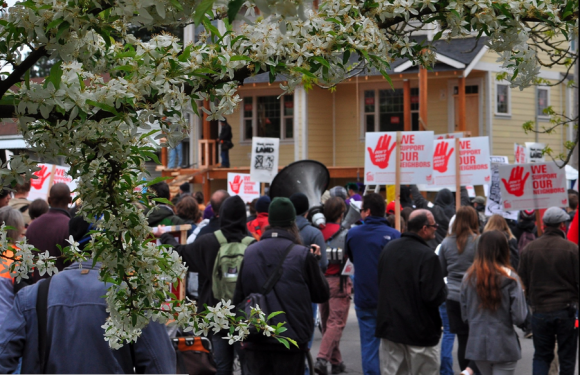
Housing Justice: Fighting for Rights
by: We Are Oregon, Kari Koch Posted on: June 08, 2013
Editor’s Note: As banks continue to foreclose our homes a new narrative about housing—one focused on rights—begins to emerge. Kari of We Are Oregon, a community and labor organization in Portland, Oregon, lays the framework from which this narrative is sprouting. Kari exposes how the state protects legally enforceable corporate rights, but only ‘honors’ human rights through unenforceable resolutions. Removing corporations’ rights and enforcing human rights, Kari says, “requires removing the state as the protector of corporate interests.”
By Kari Koch, We Are Oregon
The headlines would have us believe that the housing crisis is over and foreclosures are no longer a serious threat to our communities. However, in Portland, Oregon we have an affordable housing crisis, with an estimated 5,000 houseless people and thousands of empty homes. Thousands of families are one missed paycheck or illness away from stumbling on their mortgage, while big banks are again making record profits.
When a family loses their home, all the wealth they’ve invested in that home evaporates. For many families, especially in communities of color, the house is a primary vehicle for long-term savings and financial stability. The irony is that after families lose their homes, many of them remain empty. The whole community suffers while the banks sit on property, waiting for another market boom.
 In late January 2013 the Austin family, who had been publicly fighting eviction since 2011, was forcibly removed from their home by the Multnomah County Sheriff and the Portland Police at the behest of national mortgage giant, Fannie Mae. After the family was kicked to the street, armed security guards were posted in their home to make sure it remained empty while Debbie, Ron, and their two children were left houseless. This problem goes far beyond one family and speaks to the deep fraud and failures in our housing system.
In late January 2013 the Austin family, who had been publicly fighting eviction since 2011, was forcibly removed from their home by the Multnomah County Sheriff and the Portland Police at the behest of national mortgage giant, Fannie Mae. After the family was kicked to the street, armed security guards were posted in their home to make sure it remained empty while Debbie, Ron, and their two children were left houseless. This problem goes far beyond one family and speaks to the deep fraud and failures in our housing system.
Organizing for housing justice is fundamentally about building strong communities and winning housing for all people regardless of ability to pay. The housing justice community is publicly fighting back against the banks, developers, and their legal protectors. Families across Portland have come forward to put a face on foreclosure and to say that they will not move out. Homeowners are partnering with community members, renters, and the houseless to name foreclosure as nothing more than bank fraud for profit. They fight for a core social value–that housing is a human right.
In Portland, the Multnomah County Sheriff Dan Staton is the person who carries out evictions. The housing justice community has approached the Sheriff about the fraud and irregularities in the housing system and asked him to stop enforcing foreclosure evictions until those injustices are addressed, and to follow the example of other sheriffs across the country who have responded to the housing crisis by calling temporary moratoriums (or stoppages) on evictions. Families have presented evidence, shared their stories, written letters, and applied all means of traditional civic pressure to encourage the Sheriff to reconsider his role in kicking families out of their homes.
Turning to public demonstrations and direct actions, the Portland housing justice community was finally able to get the Sheriff and the County to publicly support an eviction moratorium as part of a solution to the housing crisis. It was during a direct action sit-in at the Sheriff’s office that the community outlined a path toward a moratorium that was adopted by the Sheriff and County Chairman. The path includes publicly moving towards a legal moratorium in conjunction with the judges that issue eviction orders, requires the Sheriff to personally be present and responsible for all evictions in the mean time, and requires the pursuit of rampant fraud and irregularities in the banking mortgage industry.
In the short term, a moratorium would directly buffer homeowners and renters from houselessness. More broadly, a moratorium and the work of the housing justice community would force the state to stop blindly enforcing the will of the financial industry. Instead, the state would be charged with punishing banks for manipulating families out of their homes.
This would reflect a direct change in the relationship between the state, the community, and the banks. Currently, the state enforces the banks’ legal and property rights above all else. The work of the housing justice community is in holding the banks accountable and stopping evictions, but also in shifting US culture around the purpose and value of property, specifically who has a right to property and how it should be used. Corporations see our homes as vehicles for profit, while the housing justice community supports a vision of housing as a preeminent right, and property as a collective responsibility–not an asset to be used to turn a profit.
The work of the housing justice community shines a light on a critical contradiction; the government purports to support the common good but consistently protects the property rights of corporate banks at the expense of peoples’ right to housing. Not only does the government uphold corporate interests, but routinely enshrines those corporate interests into legally enforceable rights while “honoring” human rights as unenforceable resolutions.
Through direct action, housing justice organizing is making it possible for community members to stay in their homes, while the burden of proof for the legality of the mortgage and foreclosure processes is shifting to the banks. This has not historically been the standard, but public pressure is slowly catalyzing this change.
One critical means to secure the rights of the homeowner or resident is the physical control of the house. Once people move out of their homes, the banks have much greater power to claim the house, even if only through an assumption of guilt based on self-eviction. The first rule of foreclosure resistance is Don’t Move Out.
The struggle for the right to shelter, however, cannot be won on a case-by-case basis. In fact, property, or land, is a collective responsibility. We defend homes in part because no family should be houseless, but increasingly because as neighborhoods, as communities, and as a movement, we believe that this land belongs to us and we want to have a voice in how it is distributed and used. While we support homeowners in negotiating with banks, ultimately to remove the unjust rights that corporations hold and enforce human rights, including the right to shelter requires removing the state as the protector of corporate interests. This means that the economic market, in this case as it relates to housing, must be changed. This economic shift towards prioritizing human rights can begin with principle reduction, taking homes entirely off the market, and a complete moratorium on evictions. Human rights to resources will never be prioritized or decommodified in the capitalist market or in an economy that demands profit above all else.
As Frederick Douglass said, “power concedes nothing without a demand.” The discourse of rights assumes that a right is given and must be protected, meaning that rights are derived from power as much as morality. The achievement at the Sheriff’s office demonstrated that when those in power refuse to work for the people, the people will assert their rights.
Photos: K. Kendall, flicker
** Alejandro Juarez, Adam Coble, and Angela MacWhinnie contributed to this article.
2 Responses to “Housing Justice: Fighting for Rights”
Articles On Community Rights
Community Rights:
- May 19 Part 2: Jordan Cove LNG Backers Spend Huge Money to Sway Tiny Oregon County Election
- May 2 Part 1: Oregon County Faces Gas Industry Funding, Lobbyists in Battle to Halt Jordan Cove LNG Project
- Jan 12 For Teachers and Citizens: How to Respond to Federal Immigration Raids
- Jan 5 How To Respond When Your (Local) Government Gets Sued By A Corporation
- May 25 Interview: The Working Class Movement Fighting for Local Authority
- Apr 29 Interview: Challenging Corporations’ ‘Right’ To Grow GMOs in Rural Oregon
- Nov 3 Cancer Clusters Spark Historic Pesticide Vote in Oregon
- Dec 8 The Devil In The Details of Local Law
- Dec 8 Don’t Tread On Us-A Message from Colorado
- Dec 8 Making Sense of Recent Legal History
- Dec 8 Where Push Is Coming To Shove, USA
- Nov 8 The First Big Win for the $15 Movement
- Nov 8 A Legal Definition for ‘Unsustainable Energy’?
- Oct 8 When The State Pushes Back
- Oct 8 This Crow Won’t Fly
- Oct 8 A New County Constitution
- Sep 8 Homeless Bills of Rights-New Narratives
- Sep 8 Colorado Anti-fracking Movement Heating Up!
- Sep 8 Local Initiative Process Gutted
- Aug 8 Obstacles to Asserting Rights
- Aug 8 Benton County, OR Moves Forward with Nation’s Potential First Food Bill of Rights
- Jul 8 Spokane Continues to Fight for the Right to Vote
- Jul 8 Foster Youth Bill of Rights, New Narratives
- Jul 8 Santa Monica Passes West Coast’s First Rights of Nature Ordinance
- Jun 8 Housing Justice: Fighting for Rights
- Jun 8 A Community Rights Ordinance For South Puget Sound
- Jun 8 County Government Writes History, Hydrocarbon Ban is First of its Kind
- Jun 8 Food Bills of Rights and Monsanto-Speech
- Jun 6 GM Wheat Discovered in Oregon, Benton County Continues Work on Food Bill of Rights
- May 8 Does Food Sovereignty Exist in the United States? Food and the Community Rights Movement
- May 8 Washington Community Action Network Talks Rights
- Apr 7 Under the Radar: How a Multinational Corporation Quietly Bought a County-Wide Election
- Apr 2 Day One of the Occupation of Detroit
- Mar 25 Crude Oil Trains Proposed for Grays Harbor, WA: Citizens Challenge Permitting Process
- Mar 18 Middle School Elevates its Rights above Corporations’
- Mar 12 What a Difference a Degree Makes
- Mar 2 The Story of Broadview Heights, Ohio
- Feb 17 Democracy Denied in Small Town, USA
- Feb 4 The View from Plymouth, NH
- Jan 27 Benton County’s Fight to Protect Our Seed Heritage: A Food Bill of Rights
- Jan 16 Fighting for the Right to a Sustainable Food System: Benton County, Oregon
- Jan 6 Rivers and Natural Ecosystems as Rights Bearing Subjects
- Dec 31 Case Study: The Community Right to Sustainable Energy
- Dec 24 Barnstead, NH: Establishing the Community Right to Water and Self-Governance
- Dec 19 New Section: Community Rights
- Sep 23 Changing ‘Fundemental Law’, a Case Study: Bellingham
- Mar 29 The Right to Self-Govern


by: Abe Cohenon: Saturday 8th of June 2013
by: Judith Lienhardon: Monday 10th of June 2013